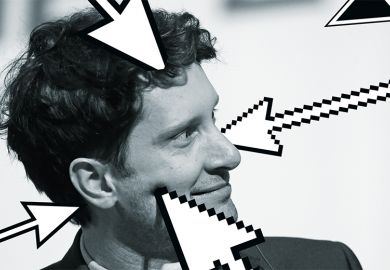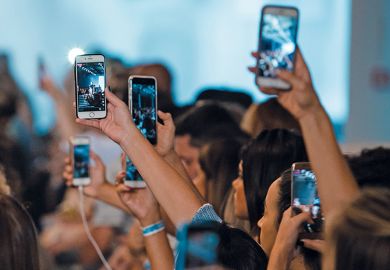The University of Cambridge has been accused of washing its hands of the conduct of a researcher at the centre of a Facebook data-harvesting scandal, in a case that raises wider questions about institutions’ responsibility for academics’ outside activities.
Aleksandr Kogan, a cognitive and behavioural neuroscience researcher, used a Facebook quiz app to gather profile information from 30 million Facebook users. He then passed these data to Cambridge Analytica, a company accused of using this information to target voters online in an attempt to sway the 2016 US presidential election in favour of Donald Trump, a claim it denies.
Dr Kogan’s method of data harvesting is particularly controversial because the app was able to gather information not only from those who chose to use it but also from their Facebook friends, who were not explicitly asked to consent. Facebook has said that it stopped apps collecting information from friends so easily in 2014.
Bill Cooke, a professor of strategic management at the University of York who has a long-standing interest in business ethics, wrote to Cambridge in 2015 to ask it to investigate Dr Kogan after reports first surfaced that Cambridge Analytica had obtained a massive cache of Facebook user data and was working with conservative political figures in the US.
In response, the university told him that the data gathering was “not undertaken at the University of Cambridge. Dr Kogan’s involvement in the matter related to his role in a private company.”
In light of the latest stories about Cambridge Analytica, the university has distanced itself from Dr Kogan’s activities. “The university and Dr Kogan have made clear that Dr Kogan’s work with GSR Ltd [Dr Kogan’s company] was undertaken in a private capacity and in his capacity as a director of the company. GSR Ltd was, therefore, responsible for the oversight of the research integrity matters arising from the process to collect data from Facebook users by GSR,” a university spokesman told Times Higher Education.
This response is “inadequate”, said Professor Cooke. “It failed to address [the university’s] own research code of practice, which says that even if members [of staff] are doing work outside they are still accountable,” he said.
Cambridge researchers must abide by ethics rules even for “research undertaken by university employees outside the university and overseas”, according to the university’s ethics policy for personal data. “Except where the nature of the research or participants makes this impossible, free and informed consent must be obtained from all participants in research at an appropriate point in the research process,” the policy states.
The Cambridge spokesman said that the reference to “outside” research referred only to work undertaken as part of their university duties.
The furore around Dr Kogan raises questions over whether universities should hold their academics ethically accountable for research that they conduct on the side.
Andrew Wakefield – the doctor who was struck off by the General Medical Council in 2010 for having falsely claimed that there was a link between autism and vaccination – was not allowed to argue “I was doing this in a private capacity”, Professor Cooke pointed out.
Cambridge’s response to the data-harvesting scandal has been, in effect, “it’s nothing to do with us”, he said. Incidents such as the Cambridge Analytica scandal could damage the credibility of all researchers, Professor Cooke warned.
Elizabeth Bishop, a research ethics manager at the UK Data Archive, said that even when academics engaged in outside work, “the point is we have power and privilege…due to the attachment to these universities”.
Dr Kogan has said that he had not known how Cambridge Analytica would use the Facebook data, and that would feel “absolutely horrible” if the information had been deployed to target voters in the US election.
Facebook has accused Dr Kogan of violating its policies by passing user data on to Cambridge Analytica. The researcher said that the sharing was legal and that he was being scapegoated by the social media firm.
Register to continue
Why register?
- Registration is free and only takes a moment
- Once registered, you can read 3 articles a month
- Sign up for our newsletter
Subscribe
Or subscribe for unlimited access to:
- Unlimited access to news, views, insights & reviews
- Digital editions
- Digital access to THE’s university and college rankings analysis
Already registered or a current subscriber?



